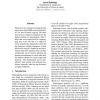Free Online Productivity Tools
i2Speak
i2Symbol
i2OCR
iTex2Img
iWeb2Print
iWeb2Shot
i2Type
iPdf2Split
iPdf2Merge
i2Bopomofo
i2Arabic
i2Style
i2Image
i2PDF
iLatex2Rtf
Sci2ools
COLING
2008
2008
Weakly Supervised Supertagging with Grammar-Informed Initialization
Much previous work has investigated weak supervision with HMMs and tag dictionaries for part-of-speech tagging, but there have been no similar investigations for the harder problem of supertagging. Here, I show that weak supervision for supertagging does work, but that it is subject to severe performance degradation when the tag dictionary is highly ambiguous. I show that lexical category complexity and information about how supertags may combine syntactically can be used to initialize the transition distributions of a first-order Hidden Markov Model for weakly supervised learning. This initialization proves more effective than starting with uniform transitions, especially when the tag dictionary is highly ambiguous.
| Added | 29 Oct 2010 |
| Updated | 29 Oct 2010 |
| Type | Conference |
| Year | 2008 |
| Where | COLING |
| Authors | Jason Baldridge |
Comments (0)

